- Home
- Nancy Pickard
Bum Steer Page 2
Bum Steer Read online
Page 2
“Wait a minute.” I nearly put my hand on Brady’s arm. “Isn’t this the hotel where all those people died when some skywalks fell down?”
“Yes,” he said. “It happened right there in that lobby.”
I remembered now: concrete balconies had come crashing down during a dance, killing more than one hundred people. Nausea rose in my throat again as I looked in. I felt as if Brady were asking me to sleep in a crypt. If I had been less tired, or less afraid of looking foolish and oversensitive, I might have asked him to take me somewhere else to stay.
“You don’t need to go in with me, Dwight.”
I did not want to make small talk in that lobby.
“Thanks, I do need to get home.”
He retrieved my suit bag and briefcase from his trunk and handed them over to a bellman. Standing there in the circle drive, Brady and I bade each other polite good-nights.
As I followed the bellman to the reception desk, I picked my feet up quickly from the red tiles in the lobby. I felt as if I were walking disrespectfully on graves, although the shiver that crawled down my spine suggested someone walking on my own grave. It struck me as ghoulishly appropriate to stay in this hotel before meeting a dying man.
Such a comfort, that thought was.
I dreamed that night of falling from a great height. I jerked awake at four-thirty in the morning, just before my dream body hit bloodred tiles.
I couldn’t get back to sleep, so I stayed up, propped against pillows, reading and rereading Brady’s long letter regarding the bequest of the Crossbones Ranch, looking for clues as to reason or cause. Brady’s letter detailed the assets we would inherit, including tractors and post-hole diggers (equipment, I assumed, not people), horses and barns, even natural-gas wells, which I could only hope might keep the ranch afloat during the inevitable lean years when cattle sold for less than it took to raise them.
It did not explain why the Benet family was barred from the ranch, though it did name them and list their addresses: there was an Alice Lawrence, a Merle Lawrence, a Lilly Ann Lawrence, and a Margaret Stewart, all from right here in Kansas City; there was an Anna Railing, Mark Railing, and a Suanna Railing, all of Winnetka, Illinois; there was a Marvalene Podhurst and a Daniel Zeller of San Diego, California; a Judy Benet and a Ladd Benet of Fort Worth, Texas; and a Frederica Sue Gomez of Santa Fe, New Mexico.
Neither did the letter say why Charles Whitepaw Benet IV, famous cowman from Texas, had picked the Civic Foundation of Port Frederick, Massachusetts, to receive his largess.
“That’s the first question I’m going to ask you, Cat Benet, when I meet you in the morning,” I said aloud, and then I noticed the light oozing in around the edges of the draperies.
It was morning. Friday morning.
3
At six-thirty, I ordered room service to avoid eating breakfast in the mezzanine café that overlooked the lobby where all those people had died. The waiter who brought up my rolls, coffee, and scrambled eggs told me the orchestra had been playing “Satin Doll” when tons of concrete buried the dancers. He’d been on duty that night. The lobby, he said, had been ankle deep in blood and water from burst mains.
He removed the silver cover from my plate of scrambled eggs. The aroma gagged me. I put the lid back on.
“What caused the disaster?” I asked him.
He shrugged cynically. “Nobody ever said, officially.”
“But that’s appalling!”
“Yeah, it was like being bombed and never finding out who was flying the airplane. It sure looked like a bomb hit.” His hands on the silver coffeepot were steady, but the cuticles around his nails looked painfully raw, as if he picked at them all the time. “I still get nightmares. My psychiatrist says it’s because wounds that don’t close can’t heal.”
It was a thought I was to recall, ironically, in the days and maybe even years ahead. But for the moment, all I said was, “Why do you keep working here?”
He shrugged again. “It wasn’t Hyatt’s fault, we do know that. Anyway, who else’d want me, nerves shot to hell and all.”
I signed a two-dollar tip onto the bill.
“Thanks,” he said. “Bon appétit.”
After his story, I never did manage a bite of those eggs, but I consumed the whole pot of coffee before I checked out. Then I escaped from that haunted lobby and waited outside under the canopy for Dwight Brady to arrive. It was still raining, with some clearing to the west.
“Sleep well?” Brady inquired when I slid in.
“Like a log,” I lied.
The Kansas City Medical Center was in a picturesque area of town that Brady called Old Westport. KCMC was one of those ancient red-brick hospitals—every big city has one—that has a vaguely sinister appearance because of its massive size and Victorian style of architecture. Reinforcing the idea that this was, indeed, a big city was the fact that there were three police cars parked in the emergency lot.
“So much firepower,” I said. “It makes you wonder if they’ve brought in a suspect instead of a victim.” Or worse yet, and I felt my chest constrict at the thought, maybe they’d brought in one of their own.
“What?” Brady gave me a funny look.
“I’m a policeman’s wife. My mind runs to assaults instead of heart attacks.”
He let me out before going off to find a parking space. When I stepped out of his car, it was right into a puddle. In revenge, I slammed the door harder than a Mercedes owner likes to have his door closed. I stepped up onto the sidewalk and looked down at my soaked leather shoes. They had started out the morning red; now they were deepening to wine. They had been very expensive. There in the rain, I sighed. Welcome to Kansas City, Jenny. You crazy little woman, you.
Inside, the hospital seemed almost cozy compared to the weather conditions outside. It was by now nearly nine A.M. (Ten A.M. back home, and they’re rounding Pebbly Point by now.) I avoided the information desk, which was three-deep in inquiring people, and found my way to room 1080 by following signs.
Straight down the hall …
Through double swinging doors.
There was a nurses’ station directly ahead of me.
The morning hospital bustle was in full swing: Orderlies wheeled groggy patients to surgery, nurse’s aides stacked trays from breakfast, doctors were interminably paged on the loudspeaker, families huddled in waiting rooms, nurses conferred with one another over phones and charts and IVs. Being flat on your back was a very busy occupation in hospitals, as in certain other trades. I sensed an especially strong undercurrent of the excitement, disguised as tension, that electrifies the air in medical centers.
Nobody paid any attention to me until I turned right, at the nurses’ station. Then I felt, not as if people were talking behind my back, but as if they had stopped talking. I almost stopped, myself, to look back, but I shrugged it off, attributing it to the fact that tall women of Swedish descent attract attention that’s way out of proportion to our relative importance to the world.
I kept my line of vision focused on the room numbers.
1072. 1074, 1076. 1078.
1080, across the hall from the closed door of 1079, was just this side of a stairwell exit. A sign on the door said NO SMOKING. OXYGEN IN USE. So it was odd that the first thing I smelled when I pushed open the door was cigarette smoke.
A uniformed policewoman blocked my path.
“You can’t come in.”
“Why not?”
“Police business.”
Over her shoulder I glimpsed two plainclothes detectives. How did I know that’s what they were? I have lived with one, that’s all I can tell you, and I knew.
“Isn’t this Mr. Benet’s room?”
“Step back, please.”
“Wait,” said one of the detectives, the one who wasn’t smoking. He walked around the bed in the room and came toward me. “I’ll go with you.”
The policewoman moved aside to let the detective through, then quietly closed the door to the roo
m again. But not before I’d had a chance to get a glimpse of a bed with rumpled sheets. A single pillow lay in the middle of the bed, and I was pretty sure that I saw an irregular circle of blood and mucus on the pillowcase.
4
My fingertips were suddenly ice cold, just as my palms began to sweat. My teeth started to chatter, so I clamped my jaw shut. When the door was firmly closed against the smells lingering in that room, I took a deep breath that was shakier than I had expected it to be. All I could think of for a moment was, Damn, I knew I should never have come to Kansas City! I leaned against the nearest wall to give my knees some extra support. (I don’t have calluses from the other deaths I have seen; I have, like that waiter, jumpy nerves and nightmares, and undependable knees.)
The detective put out his hand for me to shake as he introduced himself. I took it as an act of kindness, frankly, feeling that he knew I needed steadying at that moment. I absorbed enough strength from his firm grasp to allow me to step away from the wall, and I told myself to be cool.
“I’m Detective Luis Canales of the Kansas City, Missouri, Police Department.” He gave his name a Mexican pronunciation. Canales was about my height, five seven or eight, skinny, with an acne-scarred face, and eyelids that drooped so far over his brown eyes that they almost hid the intelligence that gleamed there. He had heavy bags under those eyes, an overnight growth of black beard, and his black suit was rumpled—all signs of a cop who has been summoned out of his bed. He wore a wedding ring. I felt a flash of sympathy for the wife who’d been asleep beside him and who was probably worrying about him right now. Canales had waited politely for me to open my mouth again. My silence forced him to ask, “Would you mind telling me who you are?”
I cleared my throat. I blurted, “A cop’s wife.”
“Really.”
“You’re homicide, aren’t you?”
“What makes you think so?”
“That’s what my husband used to be. Correct me if I’m wrong, Detective Canales, but it seems to me that the message here is that Cat Benet is dead, and that you think somebody smothered him with that pillow on the bed. Am I right?”
I was not showing off. I was anxious to know—now, immediately, at once—exactly what was going on, even if I had to put the words in his mouth in order to find out.
I had caused his eyebrows to raise.
“Are you a relative?”
“No.”
“A friend?”
“No, you don’t have to break the news gently.”
He smiled slightly. “You have it all figured out anyway.”
I must have flushed, because my face suddenly tingled, as if somebody had applied a hot washcloth to my cold skin.
“Tell you what,” he said. “Let’s try this again.” It finally dawned on me that Canales was trying to take charge of the interview and that I was not making it easy for him. Me and my smart mouth. I hadn’t meant to be obstructive. “I would appreciate it,” he continued, “if you would tell me who you are, and why you’re here.” Dwight Brady had walked up beside us during this last exchange. Canales included him in the query. “You, too.”
“Dwight,” I said, “Benet’s been murdered.”
“Well, now wait a minute,” Canales said.
“He’s what, Jenny?”
“He’s dead, Dwight, somebody killed him.”
“Please, ma’am, slow down.”
Dwight looked flummoxed. “When? Why? Who killed him?”
“My questions, exactly,” Canales said wryly. “You took the words right out of my mouth.”
In a nearby waiting room, which Canales emptied by the simple expedient of asking everyone else to leave, he took out a notebook and a ballpoint pen to make it official. We sat at a knotty pine table littered with open copies of Family Circle magazines from which recipes and coupons had been torn out. I understood that need for busy hands when you’re feeling absolutely helpless.
“Jennifer Lynn Cain,” I repeated for him. My own hands were under the table, busily rubbing themselves together.
“From where in Massachusetts?”
Dwight had already provided his name, rank, and serial number. Now, while he occupied himself with compulsively closing those magazines and putting them all in one neat pile, I answered the basic questions one at a time, exactly as Canales asked them. I knew better now than to try to anticipate him.
“Would you mind telling me your business with Mr. Benet?”
“He wanted to make a bequest to the foundation, and he had asked me, through Mr. Brady, to come to Kansas City today to discuss that bequest.”
“Which is?”
“A ranch, a thirteen-thousand-acre cattle ranch in the Flint Hills. That’s in Kansas.”
He smiled slightly. “Yes. But it’s a big area; where exactly?”
I looked at Dwight for help.
“Hood County,” Dwight said. “Near Rock Creek.”
“Okay.” Canales nodded. “How long have you known Mr. Benet, Ms. Cain?”
“I didn’t know him.”
He didn’t alter his expression. “No?”
“No, I realize this sounds strange, but I had never heard of him or his ranch until Mr. Brady called me yesterday to tell me about the bequest. And I don’t know how Mr. Benet ever heard of me or of the foundation, either.”
The detective glanced at Brady.
“I don’t know, either,” the lawyer said.
“How much is the ranch worth?” Canales asked him.
“Three to four million for the land.”
Canales raised his eyebrows at that and looked back at me. There was an old acne scar in the middle of his left eyebrow, slicing it in two. “And you never heard of him before? You’re saying he was leaving a ranch worth three or four million dollars—”
“Not counting livestock, buildings, or equipment,” Dwight interjected. Bless his accurate little heart.
“Really?” Canales asked. “What would all that add to its value?”
Brady shrugged. “Half to three-quarter million.”
Canales tugged at his left earlobe. Even it was pitted, as if somebody had repeatedly and unsuccessfully tried to pierce his ears. “I’ve got a car worth about fifteen hundred dollars, and I wouldn’t even leave it to a stranger. So how come he was leaving all this to”—he shifted his gaze abruptly to me—“you.”
“Not me,” I corrected him. “The foundation.”
“Still. How come?”
“I don’t know how come,” I said irritably. Or even why. Canales was extremely polite, but those dead-steady brown eyes made me nervous. How did a man with a complexion like that get so self-confident? Because, I thought, he had a sureness within, because he respected his own intelligence and integrity. Such a man, if he were to draw a wrong conclusion, I thought, such a man could get stuck to it. Canales’s line of questioning frightened me, and that made me cranky. I tried not to let it show again.
“Other beneficiaries?” he asked Brady.
The lawyer nodded his head.
“He was a rich man?”
“Yes.”
Canales thought about that for a moment, then he looked with great interest at me.
A beneficiary.
So to speak.
Of a wealthy, murdered man.
“Were you thinking of returning home now, Ms. Cain?”
“No. The original plan was for me to meet Mr. Benet this morning and to visit the ranch for a couple of days.” I decided now was the time to make a stab at being totally cooperative. “Would you like the phone number there in case you need to reach me?”
Canales smiled at me. “Yes.”
It was the small, private smile the hunter gives the deer when she helpfully steps out from the bushes, right into the line of sight of his rifle.
I blurted, “Are you going to tell us how he died?”
Canales shrugged. “You had it right the first time. He was smothered with his own pillow between the times the nurses looked in on him.
”
“What times were those?” I asked politely.
I expected him to ignore that question, and he did. But hell, it never hurts to ask! “He’d been sedated, but he must have awakened as it was happening. You saw the shape the sheets were in. It couldn’t have been much of a struggle, as weak as he was, but he did try to fight off his assailant. When did you get into Kansas City, Ms. Cain?”
“Now wait,” Brady started to object on my behalf. About time, I thought, but I stopped him anyway.
“I arrived at eleven-thirty last night. Dwight picked me up at the airport and took me to the Hyatt Regency Hotel where I stayed until he picked me up at eight-thirty this morning. I don’t suppose there’s anybody who can vouch for that, but nobody saw me leave, either. I mean, I didn’t leave, and so nobody can say that I did …”
That hadn’t come out right, at all.
I watched Canales scribble all that into his notepad, then click his ballpoint pen and put it back into his inside coat pocket.
On wicked impulse I said, “Don’t you want to know where Mr. Brady was?”
Dwight stared at me.
“Mr. Brady will say that he went home directly from the Hyatt,” Canales said. “He will say he stayed there until it was time for him to pick you up this morning. His wife will vouch for him, right, Mr. Brady?”
“It’s true!” Dwight said.
“I never said otherwise,” Canales murmured, and then, probably on an equally wicked impulse, he turned to me. “Anything else, Ms. Cain?”
I stared at my hands, shook my head.
Canales stood, and we followed his lead.
“Do either of you know a Carlton Everett and a Quentin Harlan?” he asked. “They’re listed on Benet’s admittance forms as the people to notify. They have a three-one-six area code and a rural post office box. I’ve tried calling, but all I get is a machine.”

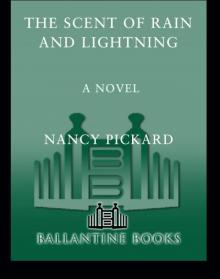 The Scent of Rain and Lightning
The Scent of Rain and Lightning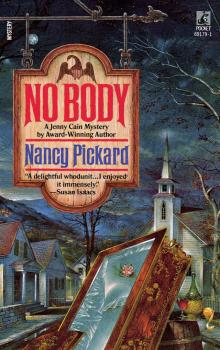 No Body
No Body The Secret Ingredient Murders: A Eugenia Potter Mystery
The Secret Ingredient Murders: A Eugenia Potter Mystery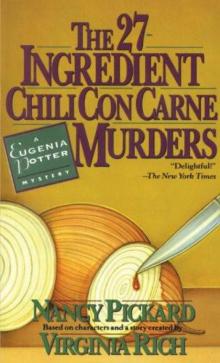 The 27-Ingredient Chili Con Carne Murders: A Eugenia Potter Mystery
The 27-Ingredient Chili Con Carne Murders: A Eugenia Potter Mystery Twilight
Twilight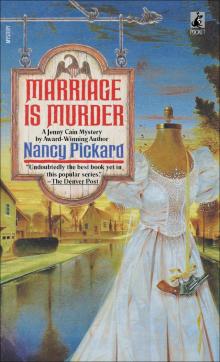 Marriage Is Murder
Marriage Is Murder I.O.U
I.O.U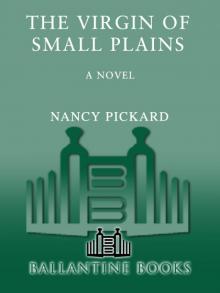 The Virgin of Small Plains
The Virgin of Small Plains Generous Death
Generous Death The Whole Truth
The Whole Truth The Blue Corn Murders
The Blue Corn Murders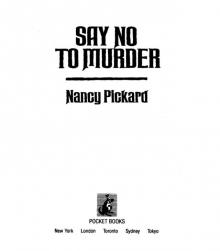 Say No to Murder
Say No to Murder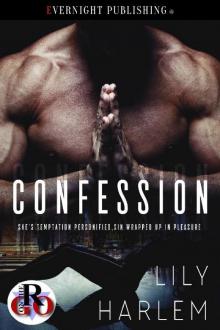 Confession
Confession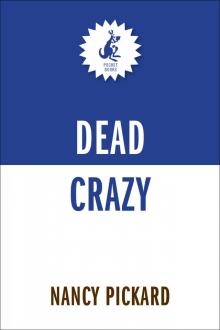 Dead Crazy
Dead Crazy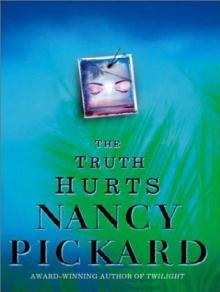 The Truth Hurts
The Truth Hurts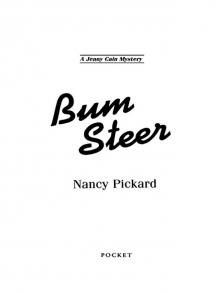 Bum Steer
Bum Steer